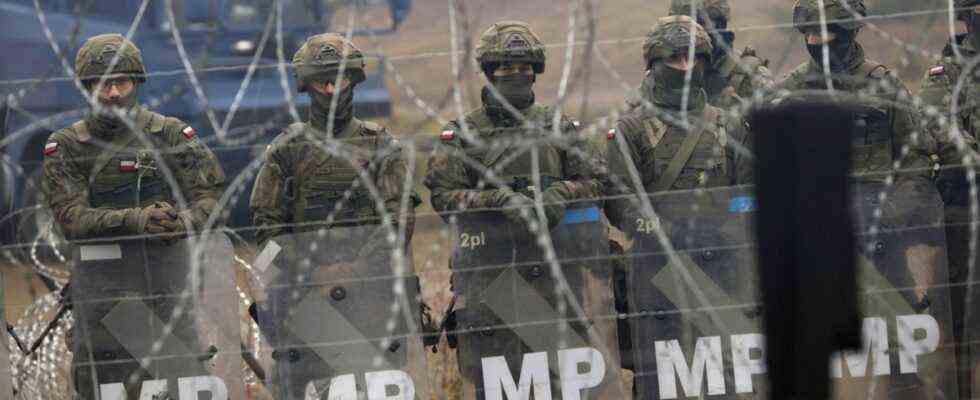The Ukrainian Foreign Minister Dmytro Kuleba informed his colleagues from the European Union in Brussels on Monday about a massive Russian troop deployment on his national border. So is Vladimir Putin planning to invade Ukraine? The Lithuanian Foreign Minister Gabrielius Landsbergis recommended taking a closer look at the map when answering this question.
Putin had his troops stationed exactly the same distance from Ukraine and Belarus. So the Russian president might consider both options: an invasion of Ukraine, but also an invasion of Belarus. An increased Russian military presence in support of the autocrat Alexander Lukashenko, at some point perhaps even an annexation are quite conceivable, said Landsbergis. In the end, Russian officials could stand on the borders with Poland, Latvia and his home country.
All of this was of course an “assumption”, said the conservative politician when asked. But he used the assumption to clarify the seriousness of the situation to the public and his 26 counterparts from the European Union. At least the Eastern European view of the seriousness of the situation. The Belarusian autocrat Alexander Lukashenko lured thousands of people into the country with the false promise that they would be allowed to cross the borders to the EU in Poland, Lithuania and Latvia and continue traveling to Germany. But behind it is Putin, said Landsbergis. Migration is the “most sensitive issue of all” for the European Union. Putin wants to destabilize the EU with it. “That’s why we have to find solutions now. And we have to build resilience for future crises.”
The 27 Foreign Ministers did their best to show determination at their meeting, chaired by EU Foreign Affairs Representative Josep Borrell. As expected, they launched another round of sanctions against the Lukashenko regime, the fifth since the brazenly rigged elections in August 2020. The new sanctions instrument is aimed at individuals and organizations involved in the smuggling of migrants into Belarus and at their political level Instrumentalization involved. In addition to tour operators and hotels, the EU is primarily targeting the Belarusian state airline Belavia. In the future, it should no longer be able to lease aircraft from European companies. Belavia conducts leasing transactions, for example, with the Danish company Nordic Aviation Capital and the Irish AerCap.
166 individuals from Belarus are on the sanctions list so far, including Lukashenko and his son and his national security advisor Viktor Lukashenko. There are also 15 organizations that are subject to sanctions. This list is now to be expanded in the next few days based on the instruments decided on Monday.
The German Foreign Minister Heiko Maas appealed to the international airlines not to bring any more migrants to Minsk. Otherwise, they would have to expect the withdrawal of overflight rights and landing permits in Europe. Turkish Airlines had already announced on Friday that passengers from Iraq, Syria or Yemen would no longer be allowed to fly to Belarus. In addition, one-way tickets to Minsk would no longer be sold. “I can only urge all airlines to join in,” said Maas. “If you don’t do that, you can expect tough sanctions.” But is that enough to impress Lukashenko and, with him, Putin?
“We are still a long way from the end of the spiral of sanctions,” said Maas. Like his Lithuanian colleague Landsbergis, he pleaded for tougher economic sanctions against Belarus. Trade restrictions are already directed against the potash, oil and cigarette industries, pillars of the Belarusian economy, but these measures do not seem to have any resounding success. The EU calls its strategy “gradual approach”. Critics call the approach half-hearted. The EU is considerate of member countries that do business with Belarus.
While the ministers were deliberating in Brussels, Vladimir Putin let it be known through a Kremlin spokesman that Russia could mediate in the conflict. Meanwhile, Alexander Lukashenko claimed in Minsk that he had already asked the migrants to return to their home countries, but that they would not listen to him. That shouldn’t be taken seriously, said the Lithuanian Foreign Minister Landsbergis. “Thousands feel deceived by Lukashenko. They thought they could travel to Germany, now they are stuck in Belarusian forests and want to go home again.” For these people there has to be a safe escort to the nearest airport. And it’s in Grodno, Belarus. The EU could “provide technical assistance” with the transfer, said Landsbergis. Lukashenko is unlikely to accept this offer from the EU either.

